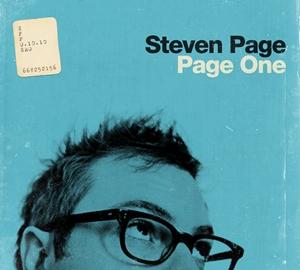
News
Summers Will Not Finish Semester of Teaching as Harvard Investigates Epstein Ties

News
Harvard College Students Report Favoring Divestment from Israel in HUA Survey

News
‘He Should Resign’: Harvard Undergrads Take Hard Line Against Summers Over Epstein Scandal

News
Harvard To Launch New Investigation Into Epstein’s Ties to Summers, Other University Affiliates

News
Harvard Students To Vote on Divestment From Israel in Inaugural HUA Election Survey
Steven Page Scrawls Parody On His ‘Page One’
Steven Page -- "Page One" -- Universal -- 3 STARS

“Be prepared for indecision / It might make me disappear,” sings Steven Page, frontman of the playful Canadian alt-rock outfit Barenaked Ladies, on his debut solo album “Page One.” And how right he was—“Page One” is a schizophrenic pop revue bouncing constantly from genre to genre, but in this indecision Page’s feeling has been lost. His senses of pop and parody are as strong on this album as they have ever been, but amidst all the flashy buildup and clever laughs, he loses an air of relatable authenticity that could have (and has) made his work into great pop.
Page seizes on genre after genre to create this diverse album’s songs, fattening the record with electro-pop, jazz, epic rock, chamber pop—you name it—but many tracks carry an air of showy parody. Page has a sharp sense of the stereotypes of each genre in which he operates—the accordions of Arcade Fire wannabes, the overdramatic echoes of Maroon 5-style pop—and in each song he mashes every cliché together with paradoxical skill and abandon. Consequently, the tracks become gaudy and conspicuous, overproduced and drawing attention to their genre associations, but they are also so realistic in their parody that it’s unclear whether Page’s goal is parody or genuine experimentation.
However, his lyrics quell all doubt. In the midst of these many “influences,” Page’s deadpan delivery and flair for clever wordiness remain a constant, instilling a sense that he’s always winking to listeners and never really taking any of this seriously. “Queen of America” begins with an Owl City-reminiscent drum-and-keyboard opening, and then Page takes the lead, singing flatly, “You’re standing at the automatic door / Letting all the heat out of the store” and quickly dispelling any pop intrigue. Even one of his most straightforward pop rockers, “Marry Me,” opens with “I am a boy, and you are girl / Or so I’ve been told.” This subtle, quirky wit is straight out of Page’s work with Barenaked Ladies, but when combined here with his fat amalgamations of genre clichés, it completes the sense that these songs are masterfully overenthusiastic parodies.
That’s not to say the tracks aren’t fun morsels of pop regardless of whether they feel like parodies—standing alone, tracks including “Queen of America,” “ She’s Trying To Save Me,” “If You Love Me,” and Third Eye Blind-reminiscent standout “Indecision” prove that Page has lost none of his flair for catchy, fun song construction.
But constant parody and genre diversity has come with a price. The album is as cohesive as oil and water, and the genuineness of Page’s emotions is sometimes spoiled by his affinity for excessive song construction and wordy gimmicks. The Barenaked Ladies repertoire had a certain boldfaced honesty in its simple instrumental construction and predictable style—the emotion simply flowed, and their clever lyricism heightened the absurdity of their subjects rather than feeling contrived or consciously quirky. Indeed, Page’s best tracks on “Page One”—“Indecision” and “Marry Me”—are those which rock while shying away from overproduction, thereby drawing attention to Page’s offbeat commentaries rather than the construction of the songs themselves. Most of “Page One” loses this relatable honesty almost completely, for Page doesn’t present any clear voice amidst his mishmash of parodies, and he drowns any feelings in his work by constructing his songs conspicuously and excessively. Constantly varying from one genre to the next is fun while it lasts, but once the album finishes, there is no sense of having heard the thoughts of Page himself—merely Page appropriating voices over and over as another tool for parody. Perhaps a greater mistake is his use of such excessive production and lyrical gimmick—even his breakup ballad, “Clifton Springs,” and his earnest love song, “All The Young Monogamists,” fall prey to seeming planned and contrived. It seems as if genuine emotions are lurking somewhere in these songs, but Page hides them behind wordplay and dense, unnecessary instrumentals. The songs end up seeming like such conscious efforts of song crafting that little genuine feeling flows out.
After singing that indecision may make him disappear, Page continues, “It’s my addiction to indecision to keep me here.” And he’s right again—it’s the senseless feeling in his songs that keeps him here at the level of simple fun and parody, rather than allowing him to reach the genuine, relatable emotion that defines great pop.
Want to keep up with breaking news? Subscribe to our email newsletter.
